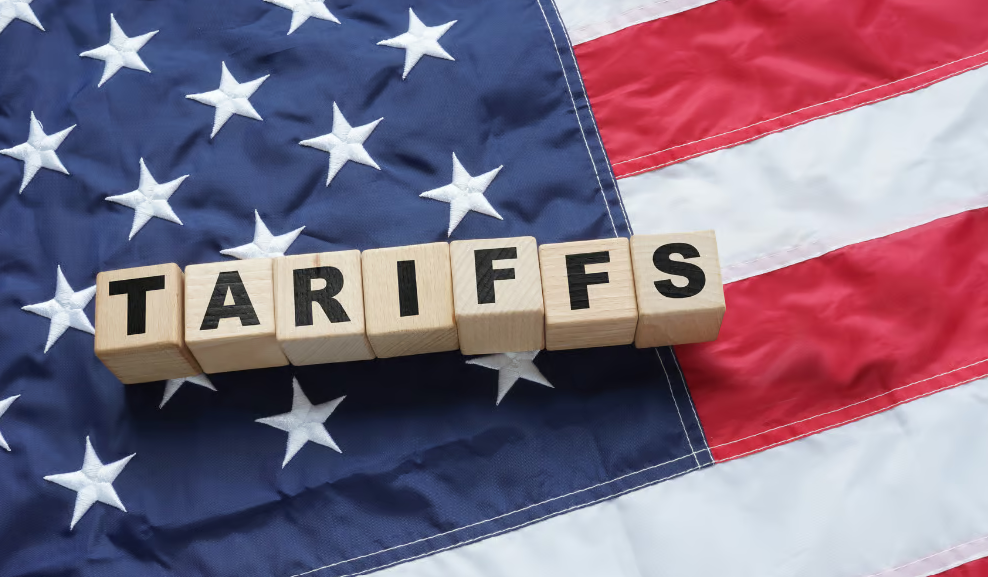

S&P Global Ratings said revenues from Donald Trump’s tariffs will help soften the blow to the US’s fiscal health from the president’s tax cuts, enabling it to maintain its current credit grade.
While Trump’s trade war has roiled markets, unnerved foreign governments and provoked criticism from leading economists, S&P affirmed its AA+ rating for the US — a score it’s given since 2011, when it first downgraded the world’s largest economy from AAA.
This is in part because it reckons money flowing from the levies will offset the impact on the US’s budget position from the recent tax and spending bill. It kept the outlook for the long-term rating stable.
“Amid the rise in effective tariff rates, we expect meaningful tariff revenue to generally offset weaker fiscal outcomes that might otherwise be associated with the recent fiscal legislation, which contains both cuts and increases in tax and spending,” analysts including Lisa Schineller wrote in a report.
Treasuries ticked higher across the curve on Tuesday, with yields on 10- and 30-year tenors slipping two basis points to 4.31% and 4.91% respectively. A gauge of the dollar traded little changed.
The decision offers a glimmer of good news for Trump by endorsing one of his arguments that imposing tariffs is already helping to improve the nation’s fiscal position. Tariff revenue reached a fresh monthly record in July, with customs duties climbing to $28 billion.
The views of ratings companies have had an important impact on the world’s biggest bond market this year. Deficit concerns prompted Moody’s Ratings to strip the US of its last top credit rating in May, bringing its score in line with S&P and Fitch Ratings. The move sent yields on 30-year Treasuries above 5% and raised the risk of forced selling from some pension funds.
S&P said the stable outlook indicates its expectation that while the fiscal deficit won’t meaningfully improve, it also won’t persistently deteriorate over the next several years. The company expects net general government debt to surpass 100% of GDP over the next three years, but it thinks the general government deficit will average 6% from 2025 to 2028, down from 7.5% last year.
“It doesn’t signal any material change in the US fiscal health, which is a complex issue,” said Homin Lee, senior macro strategist at Lombard Odier Ltd. in Singapore. He adds the recent Moody’s downgrade created a lot of anxiety but it was “really just symbolic” and lagged a change in market perceptions.
Whether tariffs will give the US a meaningful revenue boost is a subject of debate among economists, who point to an apparent contradiction at the heart of Trump’s approach: the revenues rely on trade, but Trump has also attempted to pull production back to the US and encourage consumers to buy American-made products — moves that would undercut future levy receipts.
US Treasury Secretary Scott Bessent has said tariff revenues for all of 2025 could be “well in excess of 1% of GDP,” revising his previous estimate of $300 billion. The nonpartisan Congressional Budget Office estimates the recently passed budget law will add $3.4 trillion to the deficit over the next 10 years.
“The pressures on the Fed to again consider defying rates markets and hold next month just received a (rather modest) boost as S&P Global Ratings delivered a solid report card for the US’s economy and outlook.”
- Garfield Reynolds, MLIV Team Leader.
For now, market participants are focused on Fed Chair Jerome Powell’s speech at Jackson Hole on Friday, as they try to gauge whether Treasuries are set for a boost from US interest-rate cuts.
The S&P report offers “no major support for bonds,” said Chris Iggo, CIO for core investments at AXA Investment Managers, adding that tariff revenue may decline if US consumers switch away from imported goods in favor of domestic. The “most important factors remain to be inflation, jobs data and the Fed’s stance,” he said.
© 2025 Bloomberg L.P.

Wells Fargo has also added more than $800 million in new AUM with recruitments from UBS, Osaic, and Merrill Lynch.

Also, Merit has added an $860 million RIA to bolster its Texas presence while Concurrent's asset management arm partners with a boutique investment shop.

Wells Fargo, Commonwealth, UBS are the firms losing advisor teams.

Firms are facing increasing scrutiny over whether they can be held responsible for losses by clients whose ability to understand their investments has been compromised.

Decision deepens the two firms' decade-long relationship.
Orion's Tom Wilson on delivering coordinated, high-touch service in a world where returns alone no longer set you apart.
Barely a decade old, registered index-linked annuities have quickly surged in popularity, thanks to their unique blend of protection and growth potential—an appealing option for investors looking to chart a steadier course through today's choppy market waters, says Myles Lambert, Brighthouse Financial.
